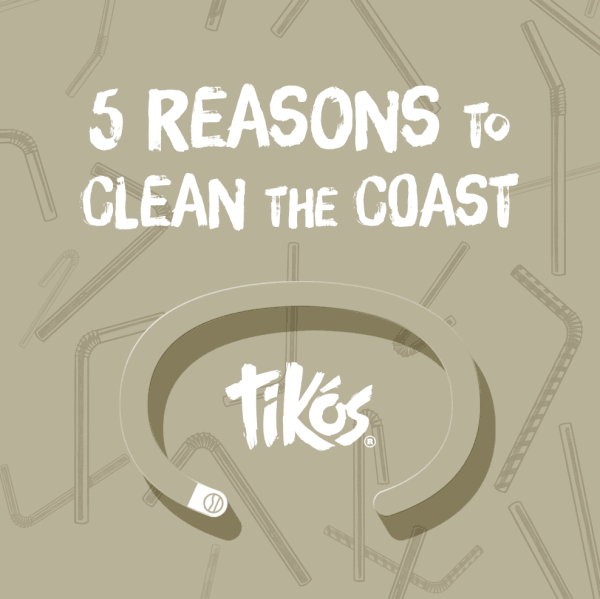
5 Reasons to Clean the Coast
Keeping our oceans pristine and free of our trash is key to a healthy marine environment. Ocean trash is a global problem that is harming every corner of the world, but there are simple steps we can all take to play our part in protecting our waters.
One of the easiest things we can do? Take our trash (and any we come across!) when we leave the beach. Here are five reasons why you should take the Tikós pledge to clean the coast.
1. Trash is choking our oceans.
Ocean plastic is dominating the headlines right now, and for good reason: More than 8 million tons of plastic enter the ocean every year. It’s estimated that there are 5.25 trillion pieces of plastic floating in the ocean.
But, plastic only makes up 60-80% of the trash that’s polluting our waters. Cigarettes and filters are the most common items found during beach clean-ups in the past 25 years. Wood, paper, and metal objects make their way into the ocean and onto beaches worldwide. Fishing gear that was lost, abandoned, or damaged floats in the currents and can seriously injure and kill innocent marine animals, like whales.
2. Ocean trash is killing countless animals.
More than one million marine animals are thought to die from ocean plastic every single year. Animals can get entangled in our trash or inadvertently ingest it and die. By cleaning the coast, you’re helping to save these innocent animals from untimely deaths.
3. There are garbage patches across the globe.
Rotating currents called gyres are collecting marine litter in our oceans. The litter, which is not always visible, is spread across the surface of the water and drops down to the ocean floor. The Great Pacific Garbage Patch is the most famous garbage patch in the ocean and is broken up into two patches, extending from the coast of Japan to the western coast of North America.
4. Trash is making its way deep into the ocean.
Our garbage doesn’t just end up floating on the surface of the ocean or on beaches, it can sink down to incredible depths. In fact, trash was recently found in the deepest part of the ocean: 6.8 miles below the surface in the Mariana Trench. Seeing evidence of humans that deep down is a stark reminder that the choices we make on land can have a damaging ripple effect to ecosystems a world away.
5. Microplastics are ending up in the food chain.
When plastic is in the ocean for long periods of time, it can break down into tiny pieces known as microplastics. Microplastics measure less than five millimeters across, making them easy for marine animals, both big and small, to swallow. We can then end up ingesting these microplastics as they travel up the food chain, and it’s unknown what impact they may have on human health.
Do you part to keep the oceans clean and free of trash. Bring a bag with you every time you head to the beach or any outdoor area (inland trash can easily make its way to the ocean via rivers) and clean up after yourself. Make sure to collect any litter you come across.
Take it one step further a wear a Tikós Clean the Coast cuff and take the pledge to keep our beaches clean! Tikós is a daily reminder for everyone to #makewaves for marine life.
Help remove even more trash from the ocean by purchasing a Tikós cuff and our apparel made from recycled plastic.
